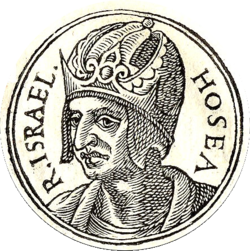
Back Hosea (Koning) Afrikaans هوشع ملك إسرائيل Arabic هوشع ملك اسرائيل ARZ Осій (цар ізраільскі) Byelorussian Hoshea (roue Israel) Breton Oixea Catalan Hóšea Czech Hoschea German Ωσηέ (βασιλιάς) Greek Hoŝea (reĝo) Esperanto
You can help expand this article with text translated from the corresponding article in Hebrew. (May 2012) Click [show] for important translation instructions.
|
| Hoshea | |
|---|---|
| King Of Israel | |
 Hoshea from "Guillaume Rouillé's Promptuarii Iconum Insigniorum | |
| King of Israel (Northern Kingdom) | |
| Reign | c. 732 – c. 722 BC |
| Predecessor | Pekah |
| Successor | Monarchy abolished |
| Born | c. 759 BC |
| Died | c. 722 BC (aged c. 36) |
| Father | Elah |
Hoshea (Hebrew: הוֹשֵׁעַ, Hōšēaʿ, "salvation"; Akkadian: 𒀀𒌑𒋛𒀪 A'úsiʾ [a-ú-si-ʾ]; Latin: Osee) was the nineteenth and last king of the northern Kingdom of Israel (or a puppet king) and son of Elah (not the Israelite king Elah). William F. Albright dated his reign to 732–721 BCE, while E. R. Thiele offered the dates 732–723 BCE.[1]
Hoshea, a trusted advisor and companion to King Pekah of Israel, seized power during a time of great turmoil. As the Assyrian Empire invaded Israel's eastern territories, Pekah's grip on the throne began to slip.
Sensing an opportunity, Hoshea conspired against his master. In the 20th year of Pekah's reign, Hoshea struck, assassinating the king during a battle against the Assyrians and the children of the east.
The Assyrian king, Tiglath-Pileser III, took advantage of Israel's weakened state and installed Hoshea as the new king. However, Hoshea's reign was short-lived, and he soon found himself at the mercy of the Assyrians.
Despite paying tribute to the Assyrian Empire, Hoshea eventually stopped making payments, hoping to assert his independence. This decision proved disastrous. The Assyrian king, Shalmaneser V, laid siege to Samaria, the capital of Israel, and after a three-year siege, the city fell in 722 BCE.
The Assyrians then deported many of the Israelites to other parts of their empire, marking the end of the Kingdom of Israel. Hoshea's rebellion had ultimately led to the downfall of his kingdom.
- ^ Edwin Thiele, The Mysterious Numbers of the Hebrew Kings, (1st ed.; New York: Macmillan, 1951; 2d ed.; Grand Rapids: Eerdmans, 1965; 3rd ed.; Grand Rapids: Zondervan/Kregel, 1983). ISBN 978-0825438257, 134, 217.
© MMXXIII Rich X Search. We shall prevail. All rights reserved. Rich X Search